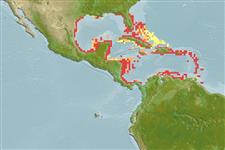>
Blenniiformes (Blennies) >
Blenniidae (Combtooth blennies) > Salariinae
Etymology: Hypsoblennius: Greek, hypsi = high + Greek, blennios = mucus (Ref. 45335); invemar: Invemar (acronym) = in honor of the Instituto de Investigaciones Marinas de Punta Betin at Santa Marta, Colombia (Ref. 94455).
Environment: milieu / climate zone / depth range / distribution range
Ecologie
marien demersaal; diepte 1 - 5 m. Tropical; 30°N - 9°N
Western Atlantic: Louisiana, USA and the Gulf of Mexico (Ref. 13628) to Rio de Janeiro, Brazil (Ref. 57756).
Grootte / Gewicht / Leeftijd
Maturity: Lm ? range ? - ? cm
Max length : 5.8 cm TL mannelijk / geslacht onbekend; (Ref. 7251)
Dorsale stekels (totaal) : 12; Dorsale zachte stralen (totaal) : 12; Anale stekels: 2; Anale zachte stralen: 14. Head and usually pectoral fin base have orange spots on dark background. Black spot on side of head behind eye (Ref. 26938). Gill opening extending ventrally to below level of ventralmost pectoral-fin ray; segmented dorsal-fin rays 11 or 12; segmented pelvic-fin rays 4; last dorsal-fin spine 3.7 to 7.5% SL (Ref. 10696).
Adults live in attached, empty barnacle shells in clear waters, usually on pilings, buoys and rock ledges at or near surface. Recorded from oil platforms. Oviparous. Eggs are demersal and adhesive (Ref. 205), and are attached to the substrate via a filamentous, adhesive pad or pedestal (Ref. 94114). Larvae are planktonic, often found in shallow, coastal waters (Ref. 94114).
Levenscyclus en paargedrag
Maturiteit | Voortplanting | Paaien | Eieren | Fecunditeit | Larven
Oviparous, distinct pairing (Ref. 205).
Robins, C.R. and G.C. Ray, 1986. A field guide to Atlantic coast fishes of North America. Houghton Mifflin Company, Boston, U.S.A. 354 p. (Ref. 7251)
Status op de Rode Lijst van het IUCN (Ref. 130435: Version 2024-1)
Gevaar voor de mens
Harmless
Gebruik door de mens
Tools
Speciale rapporten
Download XML
Internetbronnen
Estimates based on models
Preferred temperature (Ref.
123201): 24 - 28.2, mean 27.1 °C (based on 416 cells).
Fylogenetische diversiteitsindex (Ref.
82804): PD
50 = 0.5000 [Uniqueness, from 0.5 = low to 2.0 = high].
Bayesian length-weight: a=0.00776 (0.00356 - 0.01695), b=3.00 (2.81 - 3.19), in cm total length, based on LWR estimates for this (Sub)family-body shape (Ref.
93245).
Trofisch niveau (Ref.
69278): 2.9 ±0.2 se; based on size and trophs of closest relatives
Weerstandsvermogen (Ref.
120179): Hoog, minimale populatieverdubbelingstijd minder dan 15 maanden (Preliminary K or Fecundity.).
Fishing Vulnerability (Ref.
59153): Low vulnerability (10 of 100).
Nutrients (Ref.
124155): Calcium = 640 [371, 1,528] mg/100g; Iron = 1.96 [1.09, 3.53] mg/100g; Protein = 17.4 [16.3, 18.4] %; Omega3 = 0.141 [0.066, 0.294] g/100g; Selenium = 29.1 [12.9, 68.4] μg/100g; VitaminA = 36.5 [11.1, 125.9] μg/100g; Zinc = 2.95 [1.96, 4.39] mg/100g (wet weight);
